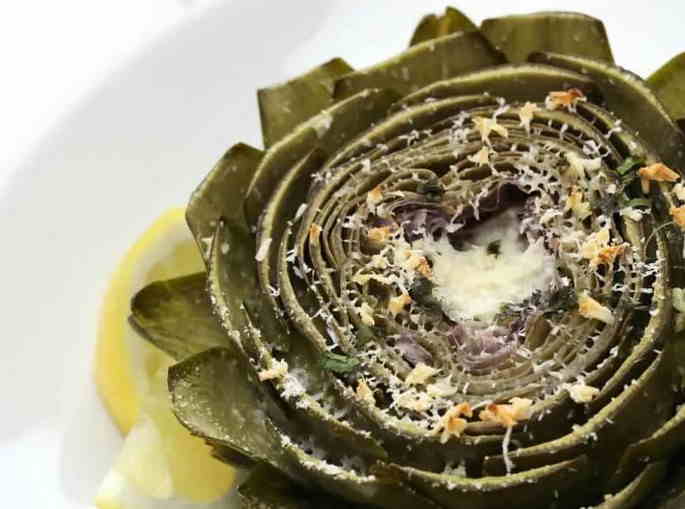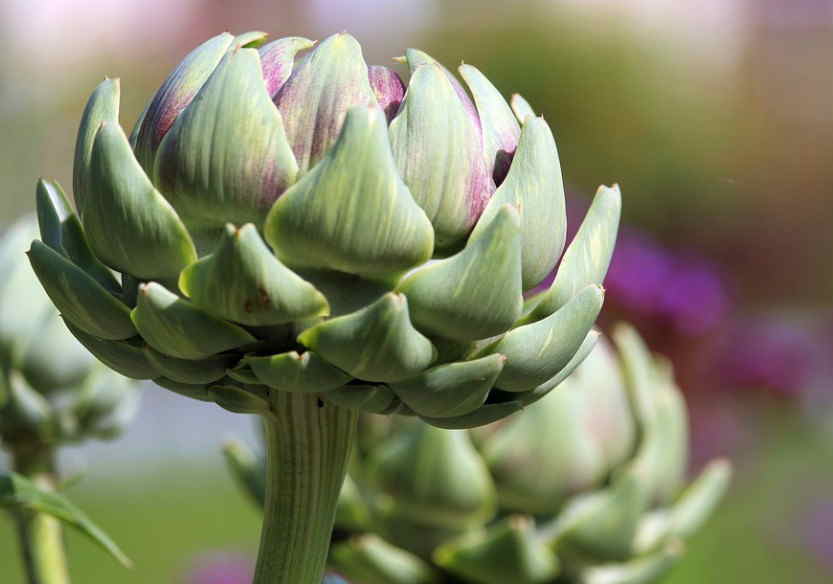Artichokes are unique vegetables that have gained worldwide recognition for their distinct taste and tough outer shell. Despite their unusual appearance, they are a culinary delight that should be incorporated more often in our meals.
They can be utilized in a variety of dishes, including salads, dips, pasta, and soups, among others. In this article, we will delve deeper into What Does Artichoke Taste Like? and suggest various ways to enjoy them at home.
Contents
- 1 What Exactly Are Artichokes?
- 2 What Does Artichoke Taste Like? Exploring the Taste of Artichokes
- 3 What Do Marinated Artichokes Taste Like?
- 4 What Does Jerusalem Artichoke Taste Like?
- 5 Different Cooking Methods and Their Impact on Flavor
- 6 Health Benefits of Artichokes
- 7 Nutritional Profile of Artichokes
- 8 How to Prepare Artichokes & How To Eat Artichoke?
- 9 Creative Ways to Enjoy Artichokes
- 10 Tips for Choosing the Perfect Artichoke
- 11 In Conclusion
What Exactly Are Artichokes?
Artichokes have a long history that dates back to ancient times. They have been used in various cuisines and have cultural significance in many countries.
Artichokes have been around for centuries and are essentially immature thistle buds that are harvested before they can bloom into purple flowers.
While some believe that the plant originated in the Mediterranean region, others think it came from northern Africa.
Regardless of their origin, artichokes have spread across the world and are now available in over a hundred varieties. The Green Globe artichoke is the most popular variety.
What Does Artichoke Taste Like? Exploring the Taste of Artichokes
How the taste of artichokes can vary depending on the type of artichoke and how it is prepared. However, it could also include information on the chemical compounds that give artichokes their distinct flavor and how these compounds change during cooking.
Artichokes have a unique earthy flavor that is often compared to celery and asparagus. However, some individuals believe that artichokes taste more like turnips and Brussels sprouts.
The flavor of artichokes can vary depending on the type of artichoke, with variations such as the petite mercury, oblong Siena, and green globe. To truly experience the flavor of artichokes, it is best to consume them fresh.
As they age, the texture and flavor of the artichoke change, so it is important to cook them as soon as possible after purchasing them or freeze them to preserve their flavor.
The preparation of artichokes also plays a significant role in determining their taste. The flavor of uncooked artichokes is vastly different from that of roasted, steamed, or fried artichokes.
What Do Marinated Artichokes Taste Like?
Marinated artichokes have a unique taste that is both tangy and briny. The marinating process gives them a slightly sour taste, which is balanced out by the saltiness of the marinade.
The texture of marinated artichokes is also slightly softer and more tender than fresh artichokes. They often have a slight crunch to them from the preserved stems and leaves, but they are not tough to chew.
Marinated artichokes can be used in a variety of dishes, from salads to pasta, and they add a bright, flavorful note to any recipe.
What Does Jerusalem Artichoke Taste Like?
Jerusalem artichokes, also known as sunchokes, have a unique flavor that is difficult to describe but is often compared to a cross between an artichoke heart and a potato.
They have a slightly sweet, nutty taste, with a hint of earthiness, which makes them a great addition to a variety of dishes.
They are also slightly crunchy when raw but become soft and tender when cooked, with a texture similar to a cooked potato. Jerusalem artichokes can be prepared roasted, sautéed, or mashed, and are a versatile ingredient in soups, stews, and other dishes.
Different Cooking Methods and Their Impact on Flavor
Raw Artichoke:
Raw artichokes have a mild, slightly nutty flavor.
Steamed or Boiled Artichoke: Steaming or boiling artichokes results in a tender, slightly sweet taste.
Grilled Artichoke:
Grilling artichokes provides a sweet flavor with the classic smoky flavor associated with grilled foods.
Fried Artichoke:
Fried artichokes have a nuttier taste, similar to that of fried asparagus.
Health Benefits of Artichokes
Artichokes are a delicious and nutritious vegetable that have been enjoyed for centuries. They are native to the Mediterranean region and are a member of the thistle family. Artichokes are not only tasty, but they also offer numerous health benefits.
1. Rich in Antioxidants
Artichokes are loaded with antioxidants, which can help to protect your cells from damage caused by free radicals. Free radicals are unstable molecules that can damage cells and contribute to the development of chronic diseases such as cancer, heart disease, and Alzheimer’s.
2. Promote Digestive Health
Artichokes are high in fiber, which can promote digestive health. Fiber helps to regulate bowel movements and prevent constipation. Additionally, artichokes contain a compound called cynarin, which can stimulate the production of bile. Bile helps to break down fats and aids in the digestion of food.
3. Support Liver Function
The liver plays a crucial role in detoxifying the body. Artichokes contain compounds that can help to support liver function.
Cynarin, for example, can increase the production of bile, which helps to eliminate toxins from the body. Artichokes also contain silymarin, a compound that has been shown to protect the liver from damage caused by toxins.
4. May Lower Cholesterol
Artichokes contain compounds that may help to lower cholesterol levels. One study found that artichoke leaf extract reduced total cholesterol levels by up to 18.5% in participants with high cholesterol.
5. May Aid in Weight Loss
Artichokes are low in calories and high in fiber, which can make them an excellent addition to a weight loss diet. The fiber in artichokes can help you to feel fuller for longer, reducing the likelihood of overeating.
6. May Improve Heart Health
Artichokes contain compounds that can help to improve heart health. For example, artichoke leaf extract has been shown to reduce blood pressure in people with mild hypertension.
Additionally, the fiber in artichokes can help to reduce cholesterol levels, which can lower the risk of heart disease.
Nutritional Profile of Artichokes
Artichoke texture are low in calories and high in nutrients. They are an excellent source of fiber, vitamins, and minerals. One medium-sized artichoke contains approximately:
- Calories: 60
- Carbohydrates: 13 grams
- Fiber: 7 grams
- Protein: 4 grams
- Vitamin C: 25% of the daily value (DV)
- Folate: 20% of the DV
- Vitamin K: 14% of the DV
- Potassium: 13% of the DV
- Magnesium: 8% of the DV
How to Prepare Artichokes & How To Eat Artichoke?
Preparing artichokes can seem intimidating, but it is relatively simple. Follow these steps to prepare a fresh artichoke:
- Cut off the top of the artichoke with a sharp knife.
- Use scissors to trim the tips of the remaining leaves.
- Cut off the stem at the base of the artichoke.
- Rinse the artichoke under cold water.
- Steam the artichoke for approximately 30 minutes, or until the leaves can be easily pulled off.
Creative Ways to Enjoy Artichokes

There are many ways to enjoy the versatility of artichokes. Some suggestions include:
• Dip them in melted butter: Peel off the petals, dip them in melted butter, pull the soft, pulpy part of the petals through your teeth, and discard the petal.
• Add them to pizza toppings.
• Mix them into your pesto sauce.
• Create a creamy spinach artichoke dip.
• Cook them into stews and casseroles.
Tips for Choosing the Perfect Artichoke
When selecting artichokes, look for those with vibrant green outer leaves that are closely packed together, avoiding those with blemishes on the leaves.
Also, try pinching the artichoke leaves with both hands to see if they make a squeaking sound, indicating freshness. Ensure the stem is slightly damp and free of any wormholes near the top, which can significantly affect the taste of the artichoke heart.
Avoid cutting the stem until you are ready to cook the artichoke, as this keeps it fresh for longer.
In Conclusion
Artichokes are versatile vegetables that should have a place in your kitchen. Once you have tasted them, you will understand why they are such a valuable addition to any recipe.
Freshness and preparation are essential factors to consider when cooking artichokes, as their taste can change with age and preparation method. With their unique flavor and versatility, artichokes are an excellent addition to any diet.
